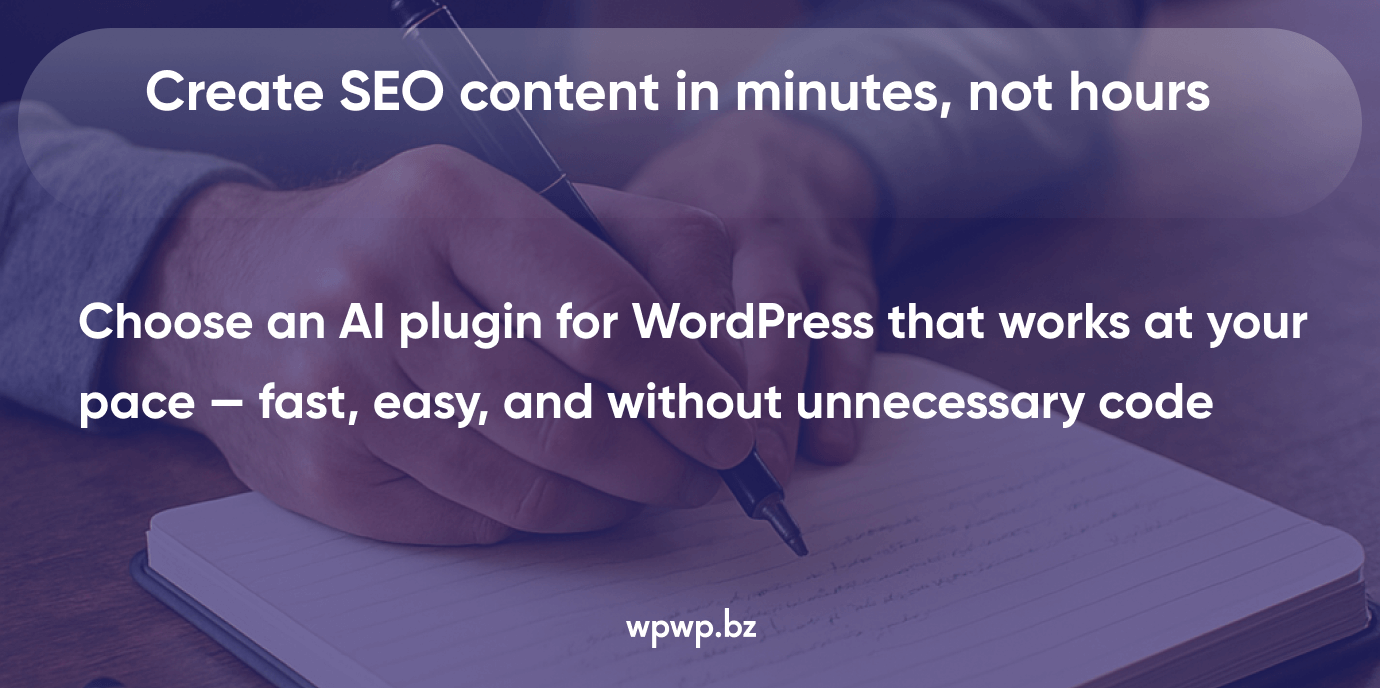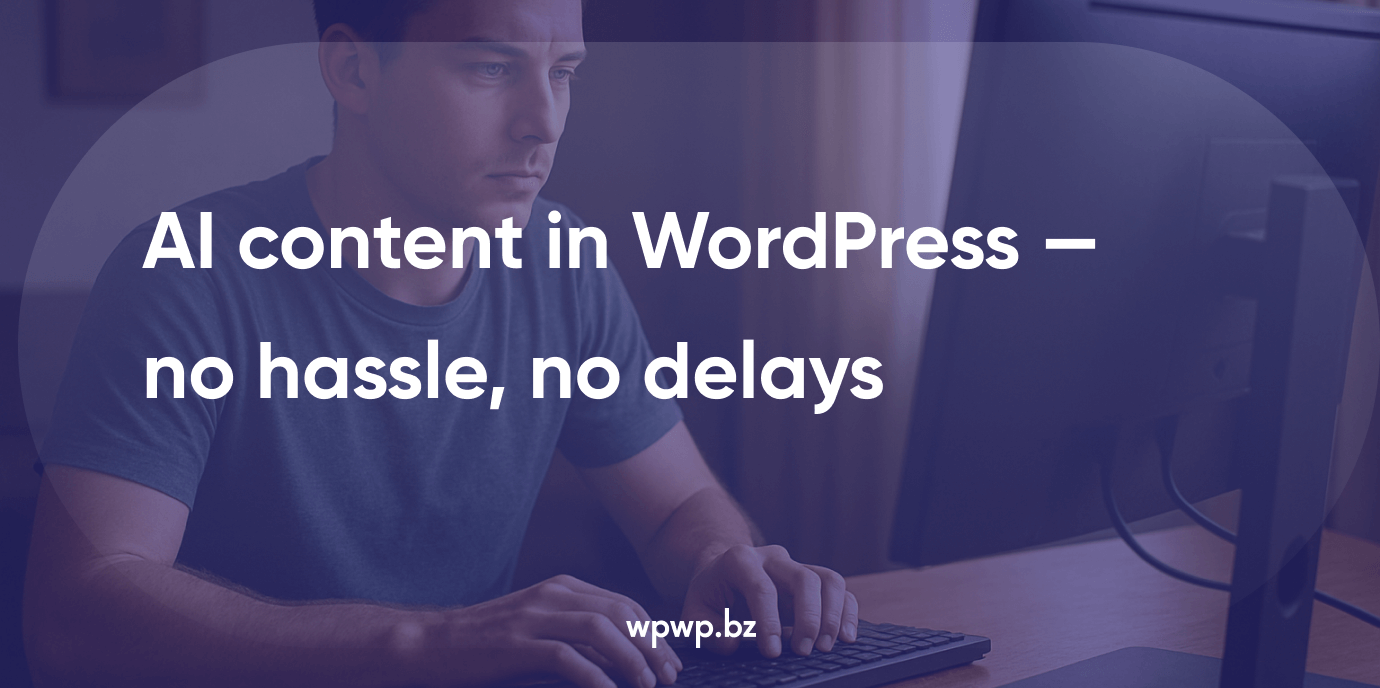
Let’s be honest — writing SEO-friendly blog posts on WordPress can eat up a lot of your day. Between picking the right keywords, organizing your thoughts, and actually putting words on the page, it’s no wonder content takes so long to produce. That’s where AI plugins for SEO come in handy.
These tools aren’t magic, but they do help you work smarter. Instead of starting from a blank screen, you get a head start, whether that’s an outline, a first draft, or just help polishing up your post. And the best part? It all happens right inside WordPress.
A lot of people are using tools like RankMath Content AI, GetGenie, or SurferSEO to save time. They’re basically SEO content generation tools that help you write faster and hit the right keywords without sounding like a robot. You can still add your voice, your tone, whatever makes your blog yours. The plugin just helps with the heavy lifting.
If you’re running a site solo or managing content for clients, this kind of WordPress AI content automation can be a game changer. It keeps things moving without cutting corners.
Up next, I’ll walk you through how to pick the right plugin and actually put it to work — step by step, with zero fluff.

Why AI Can Change How You Write for SEO
Let’s be real. Writing blog posts that actually rank takes a lot of time. You sit down in WordPress, open a blank page… and then what? You start trying to figure out your topic, the right keywords, a decent structure, before you even type a single sentence. It’s no surprise if that part alone slows you down. That’s one of the biggest SEO content challenges you’re likely dealing with.
You might be doing it all manually right now — outlining, writing, editing, optimizing, every step by hand. And sure, that works. But it takes a lot out of you. Here’s where AI for SEO content comes in. You don’t have to hand over the whole post to a machine, but you can use AI to get the wheels turning. Think of it like a writing partner who’s there when you’re stuck.
There’s always this debate about manual vs AI-generated SEO content, but honestly, it doesn’t need to be either-or. You can use both. Let AI build a rough draft, or just help with parts of it, then you jump in, clean it up, and make it yours.
Once you start using tools to automate WordPress blog writing, you’ll probably notice what I did: it’s not about skipping work, it’s about skipping the most annoying bits. Building outlines, organizing your thoughts, placing keywords in the right spots — it’s all faster. You’re still in control, but now you’re moving.
If you’ve been asking yourself why use AI for SEO writing, the answer is simple. It helps you focus more on your message and less on the busywork. That’s the real win. And that’s why so many people are turning to AI content tools for SEO — not to cheat the system, but to make the whole process easier.
Top AI Plugins for SEO Content on WordPress
If you use WordPress and want to write blog posts faster, AI content tools for WordPress can help. These plugins save time and help you get better results in search engines. Here are some of the best AI plugins for WordPress SEO that you can use right now.
GetGenie
GetGenie is a popular GPT content plugin for SEO. It helps you write blog posts, product pages, and more — right inside WordPress. It shows keyword scores and gives writing suggestions as you work.
- Pros: Easy to use, helpful templates, keyword tools included
- Cons: Free version has limits
- Best for: Bloggers who want quick results
RankMath Content AI
If you already use RankMath for SEO, this plugin fits right in. It’s an AI-powered SEO plugin for WordPress that helps with keyword use, titles, and content structure.
- Pros: Works great with RankMath, shows keyword strength
- Cons: You need to pay to use all AI features
- Best for: People already using RankMath for SEO
Bertha.ai
Bertha is a friendly AI writing tool. It gives you ideas and helps you write homepages, about pages, and blog posts. It’s not just for SEO but works well for basic content.
- Pros: Fun to use, good for simple websites
- Cons: Not as strong for SEO advice
- Best for: Business owners or designers building simple sites
AI Engine
AI Engine gives you more control. It lets you connect OpenAI (like ChatGPT) to WordPress and customize how it writes.
- Pros: Lots of settings, very flexible
- Cons: You need to know how to set it up
- Best for: Developers and advanced users
SurferSEO
This tool doesn’t live inside WordPress, but many people use it with WordPress. It helps you improve SEO by checking keywords and structure. It works well with AI-written content.
- Pros: Great for content optimization
- Cons: You need to switch between tools
- Best for: Writers who want high-ranking posts
So, which AI plugin writes content inside WordPress? GetGenie, Bertha, and RankMath Content AI all do. If you want control, go with AI Engine. For SEO scoring and editing, SurferSEO is a strong choice.
Try one that fits your style. These tools can help you write faster, improve your SEO, and spend less time staring at a blank screen.

Step-by-Step: How You Can Use AI to Write SEO Content on WordPress
So, if you’re like most people, staring at a blank WordPress post for 20 minutes is kind of the norm. That’s honestly why I started using AI tools in the first place—just to get past that first “ugh, where do I even begin” feeling.
If you’re wondering how to use AI to write SEO content in WordPress, here’s what that actually looks like in practice. No fluff, no fake promises—just how I do it.
Step 1: Figure out what you’re writing (and who it’s for)
Before I open any plugin, I take 2 minutes to think: What’s this post supposed to do? Am I trying to rank for something specific? Sell a product? Just share an update? AI doesn’t read your mind. If you don’t have a goal, the output’s going to be random.
Step 2: Choose your tool
I’ve tried a few, but I always come back to GetGenie and RankMath Content AI. They’re both solid picks if you’re looking for a WordPress AI content generator that doesn’t feel like a separate app. If you’re already using RankMath for SEO, the AI add-on just fits right in. GetGenie’s great too—more creative, in my experience.
Step 3: Install, connect, breathe
The setup’s simple. You might need to enter an API key, especially if the plugin uses GPT. That part takes maybe five minutes. After that, you’re ready to go. I usually set mine to write in a casual tone, mid-length posts, and focus on one main keyword.
Step 4: Let the AI spit something out
This is where you generate SEO content with GetGenie or RankMath. You feed in a prompt or title idea, maybe a couple keywords, and let the plugin draft something. You’ll get a basic post—definitely not perfect, but way better than a blank screen.
Step 5: Clean it up
Here’s the thing: AI can write, but it still needs you. I go through and cut stuff that feels robotic. I’ll move things around, rewrite weak intros, and fix the tone so it sounds like me. That’s the part no plugin can do for you.
Step 6: Final touches before hitting publish
The plugins help you out with SEO stuff, which is nice. You’ll get nudges like “add internal links” or “improve your headline.” I don’t follow every tip, but I usually make sure the basics are there. This is how you automate content creation with an AI plugin without losing control.
Step 7: Publish and move on
Once it sounds right and reads well, I post it. Done. Onto the next thing.
If you’ve been wondering how to create blog content with AI in WordPress, or asked yourself, can AI write optimized blog posts in WordPress?—yeah, it can. But only if you guide it. It’s not plug-and-play. It’s more like “plug-and-edit.”
You’re still the writer. The tool just helps you get there faster.

Tips to Optimize AI-Generated Content for Better SEO
Look, AI makes writing faster, but it’s not perfect. If you just copy and paste what the plugin spits out, don’t expect it to rank well. You’ve still got work to do if you want it to show up in search results. So, here’s how I usually optimize AI content for SEO after I hit “generate.”
Fix the tone
AI has a weird way of writing. Sometimes it’s too stiff. Other times it sounds like someone trying way too hard to sound smart. Either way, you’ve gotta clean that up. Read your draft out loud. If anything feels off, rewrite it in your own voice. That small step can really improve AI-generated content rankings.
Check the keyword balance
AI tools love stuffing in the same word over and over. Or they forget it altogether. Check the main keyword — make sure it’s in the headline, maybe a subheading, and a few spots in the text. That’s it. No need to jam it into every paragraph. Good SEO is about balance, not noise.
Add internal links
This one’s easy to forget. Link to your other blog posts. Link to a service page. Link to your contact form, if it fits. Internal links help people stay on your site longer and search engines like that. If you’re working inside WordPress, it’s also one of the quickest ways to optimize a blog post created by AI.
Write your own title and meta
AI titles are… fine. But fine won’t get clicks. Write your own headline — make it sharp, not vague. For the meta description, don’t just copy your intro. Tell people why they should read your post. It matters more than most folks think.
Think about semantic SEO stuff
Search engines don’t just look for one keyword anymore. They want to see related ideas, too. So if your post is about SEO plugins, talk about keyword tools, meta tags, blog structure — whatever fits. That’s semantic SEO in action, and yes, it works.
Bonus: Use schema if you can
Some plugins (like RankMath) let you add structured data — FAQ boxes, how-tos, stuff like that. It helps your post stand out in search. You don’t have to use it, but if it’s easy to add, why not?
That’s it. Don’t overthink it. Use AI to write faster, then step in and fix what it misses. Your edits are what make the content worth reading and worth ranking.
Final Thoughts & Getting Started with AI SEO Plugins
So, here’s the thing: writing SEO content for WordPress gets tiring. Even if you know what you’re doing, it takes time to research, write, and get things ranking. AI tools help, plain and simple. Not perfect, but helpful.
If you’re thinking about trying this out, don’t get stuck picking “the best one” right away. Just grab one plugin — RankMath Content AI or GetGenie are good ones to start with and try it out. Write a post with it. Edit it like you normally do. Hit publish. That’s how you get started with WordPress AI plugins. No big learning curve. Just test and see what works.
Most folks who start automating SEO content in WordPress don’t go all in on day one. They add one plugin, see what it can do, then build from there. And that’s fine.
If you don’t want to figure it all out yourself, that’s what we do. At wpwp.bz, we help people set up the best AI tools to write SEO blogs, get them running inside WordPress, and keep content flowing without needing a full team.
You don’t need to be an expert. You just need a place to start. If that’s where you’re at, we’ve got your back.


